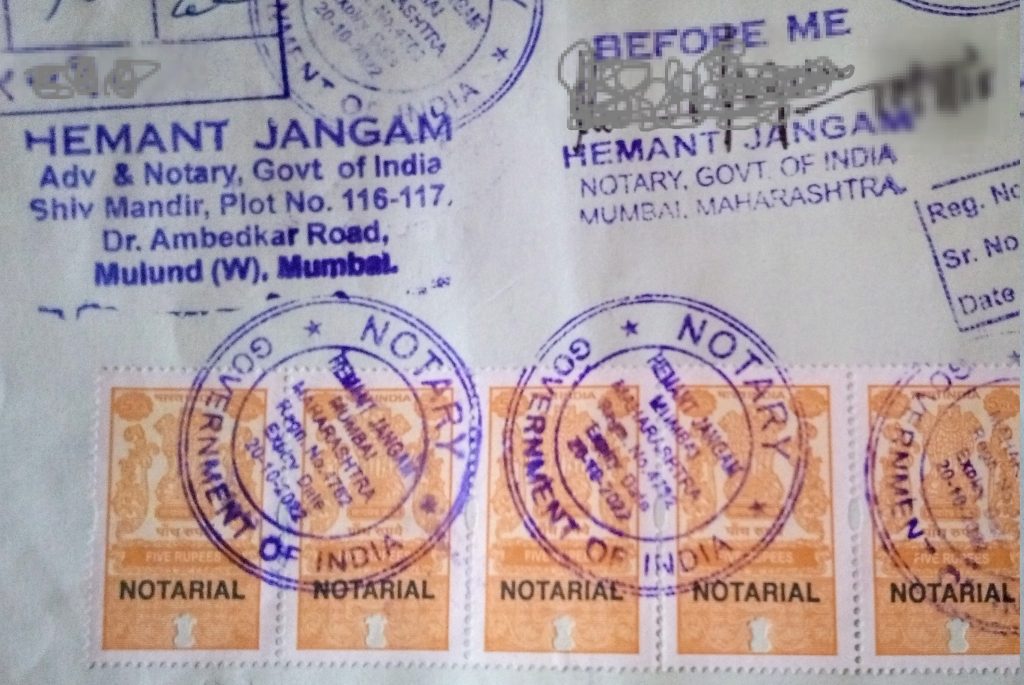This article explains the functions, rules and responsibilities of a Notary Public in India and describes the services and facilities provided by a Notary.

Who is a Notary?
A “Notary” or “Notary Public” is
- a lawyer or legal practitioner (see the Act),
- practicing in India for ten years or more (seven years in the case of a woman),
- who has the authority to
- administer oath to any person, note or protest an instrument, verify and authenticate documents, translate and verify the translation of any document, for certifying copies of documents as true copies and
- other related functions.
Who appoints a Notary?
A notary maybe appointed by the:
- Central Government or
- any State Government
By which act/statute is he appointed?
The notary is appointed under:
- THE NOTARIES ACT, 1952 (53 OF 1952)
- THE NOTARIES RULES, 1956
What are the fees that a notary can charge in India?
The rates of fees to be charged by a notary shall be displayed by him in a conspicuous place inside as well as outside his chamber or office.
Every notary shall grant a receipt for the fees and charges realised by him and maintain a register showing all the fees and charges realised.
*Read the full table of fees*
Every notary may charge fees not exceeding the rates mentioned below,
namely,-
(a) for noting an instrument –
if the amount of the instrument does not exceed rupees 10,000
Rs.35/-
if it exceeds rupees 10,000 but does not exceed rupees 25,000
Rs.75/-
if it exceeds rupees 25,000 but does not exceed rupees 50,000
Rs.110/-
if it exceeds rupees 50,000
Rs.150/-
(b) for protesting an instrument –
if the amount of the instrument does not exceed rupees 10,000
Rs.35/-
if it exceeds rupees 10,000 but does not exceed rupees 25,000
Rs.75/-
if it exceeds rupees 25,000 but does not exceed rupees 1,00,000
Rs.110/-
if it exceeds rupees 1,00,000
Rs.150/-
(c) for recording a declaration of payment for honour
Rs.75/-
(d) duplicate protests
half the charge for original
(e) for verifying, authenticating, certifying or attesting the execution of any
instrument
Rs.15/-
(f) for presenting any promissory note, hundi or bill of exchange for
acceptance or payment or demanding better security
Rs. 35/-
(g) for administering oath to, or taking affidavit from any person
Rs.15/-
(h) for preparing any instrument intended to take effect in any country or place
outside India in such form and language as may conform to the law of the place
where such deed is intended to operate
Rs. 150/-
(i) for attesting or authenticating any instrument to take effect in any country or
place outside India in such form and language as may conform to the law of the
place where such deed is intended to operate
Rs.150/-
(j) for translating and verifying the translation of any document form one
language to another
Rs.75/-
(k) for noting and drawing up ship’s protest, boat protest or protest relating to
demurrage and other commercial matters
Rs.150/-
(l) for certifying copies of document as true copies of the original
Rs.5/- per page minimum Rs. 10/-
(m) for any other notarial act
such sum as the appropriate government may fix from time to time.
* In addition to the above fees, a notary may charge the traveling allowance by road
or by rail at the rate of rupees five per kilometer. *
What is the Notarial Register? What does it contain?
- Sl.No
- Date
- Name of notarial act
- Name of executant or person concerned with full address
- Contents of document
- Notarial fee stamp affixed
- Prescribed fee
- Fee charged
- Sl.No. of receipt book
- Signature of person concerned
- Signature of notary
What type of stamp(s) will the notary put?

Every notary must use a plain circular seal of a diameter of 5 c.m. bearing
- his name,
- the name of the areas within which he has been appointed to exercise his functions,
- the registration number
- the circumscription “NOTARY”
- the name of the government which appointed him
Putting of a red seal or sticker is not mandatory and does not have any effect on the authenticity of the notaries action.
Can I get a school or college mark-sheet notarized from a Notary?
Many people often go to a Notary to Notarize a school or college mark sheet, for submitting it at various places which require Notarized Marksheets. However a Notary cannot “Notarize” marksheets. They can “attest” them to be “true copies”.
Attestation is done by the Notary to certify that he has seen the original and compared the original with the photo copy and the copy which he has attested is a “True Copy” of the Original. When attesting a document, the Notary does not need to enter the information in his Notarial Register. He simply compares both documents and verifies the copy. Entry in the Notarial register is require when administering oath for verification of the documents.
Which laws give validity to the work of a Notary Public?
Section 297 in The Code Of Criminal Procedure, 1973
297. Authorities before whom affidavits may be sworn.
(1) Affidavits to be used before any Court under this Code may be sworn or affirmed before-
(a) 1 any Judge or any Judicial or Executive Magistrate, or]
(b) any Commissioner of Oaths appointed by a High Court or Court of Session, or
(c) any notary appointed under the Notaries Act, 1952 (53 of 1952 ).
(2) Affidavits shall be confined to, and shall state separately, such facts as the deponent is able to prove from his own knowledge and such facts as he has reasonable ground to believe to be true, and in the latter case, the deponent shall clearly state the grounds of such belief.
(3) The Court may order any scandalous and irrelevant matter in the affidavit to be struck out or amended.
Section 85 in The Indian Evidence Act, 1872
85. Presumption as to powers-of-attorney.—The Court shall presume that every document purporting to be a power-of-attorney, and to have been executed before, and authenticated by, a Notary Public, or any Court, Judge, Magistrate, 1[Indian] Consul or Vice-Consul, or representative 2[***] of the 3[Central Government], was so executed and authenticated.
Section 100 in The Negotiable Instruments Act, 1881
100. Protest.—When a promissory note or bill of exchange has been dishonoured by non-acceptance or non-payment, the holder may, within a reasonable time, cause such dishonour to be noted and certified by a notary public. Such certificate is called a protest. Protest for better security.—When the acceptor of a bill of exchange has become insolvent, or his credit has been publicly impeached, before the maturity of the bill, the holder may, within a reasonable time, cause a notary public to demand better security of the acceptor, and on its being refused may, with a reasonable time, cause such facts to be noted and certified as aforesaid. Such certificate is called a protest for better security.
Is there an official Government Website in India for Notary Public and details?
Yes. you can visit https://legalaffairs.gov.in/notary-cell for more information on Notary Public and related forms.
Is there an online List of Notaries?
Yes, you can visit https://legalaffairs.gov.in/sites/default/files/List_Of_Notaries.pdf and download the PDF document which lists all Union of India appointed Notaries.
How to become a Notary in India?
To become a Notary in India, you need to fill up this form and submit it at the office of the Ministry of Legal Affairs.
https://legalaffairs.gov.in/sites/default/files/Notary_Application_Form_Format_0.pdf

what is the procedure of renewal the notary public
i would like to know the effective date of the fee schedule posted in this article. how can i know if it has been changed or upgraqded since that time?
How long the Notary has to keep the log book or register?
Notary seal must also clearly indicate validity of commission of notary ie expiry date of his notary commission
There is no provision about affixing of red steaker seal on an instrument while performing notarial act.But Indian people think the Notary is fake, if it is not affixed.
I found this blog post very informative. I am a notary public in the United States and I found this information to be very helpful. Thank you for writing this post.
which kind of document in other Notarial act